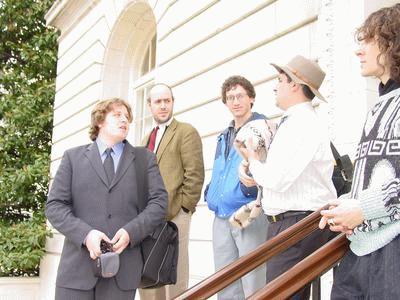
The summer of 2002 saw quite a bit of political action regarding US threats to the very existence of Internet radio. The Copyright Arbitration Royalty Panel (CARP), created by the controversial Digital Millennium Copyright Act, would wipe out US internet radio through high, retroactive, payments that do not apply to ordinary radio. Doc Searls has been covering these developments in a series of articles on our web site. If you haven't been keeping up, read “Hollywood Steps Up Its Assault on the Net While Webcasting Death March Claims KPIG” (www.linuxjournal.com/article/6246) and “Why Are So Many Internet Radio Stations Still on the Air?” (www.linuxjournal.com/6218).
In addition, the US Department of Commerce's second Digital Rights Management (DRM) workshop was held in Washington, DC, and everyone was represented on the panel except the general public. Fortunately, Linux users crashed this little party that the government threw for RIAA, MPAA and other Hollywood-interest groups. Read about it in “DRM Is Theft: New Yorkers for Fair Use Go to Washington” (www.linuxjournal.com/6243) contributed by New York Linux Scene (NYLXS) founder Ruben Safir.
We are seeing more and more clearly that Hollywood has the money and the desire to turn the Internet into a super-regulated, privacy-invading, content-management system. As Doc and others keep asking, “So what are we going to do about it?” While the general public is asleep at the wheel on this one (they'll have a rude awakening before too long), some Linux users are learning how to get politicians' ears. Ruben Safir has more to say about that in “Politics Is Local, So Get Political Locally” (www.linuxjournal.com/6250). At the local level, you can knock on doors and get meetings with your Representative in Congress. Nobody's going to do it for you.

NYLXS members Joe Grastara, Seth Johnson, Richard Weinberger, Ruben Safir and Forest Mars on their way to a meeting at the Raymond House Office Building.
On the technical side, as long as we're still allowed to write software without paying some 21st-century stamp tax, Greg Ward's article on Quixote (www.linuxjournal.com/article/6178) describes a web application framework “written by and for Python programmers”. Quixote has its own templating language based on Python code “to generate long text strings such as HTML documents” instead of “embedding Python code in an HTML-like template language”. This definitely is an approach designed for web programmers rather than designers used to an HTML editor.
We get a lot of submissions for Linux Journal, and due to space limitations in print, many helpful tutorials, reviews and news items appear on the web site instead. Articles are available on the site dating back to 1994, and new ones are posted every day.